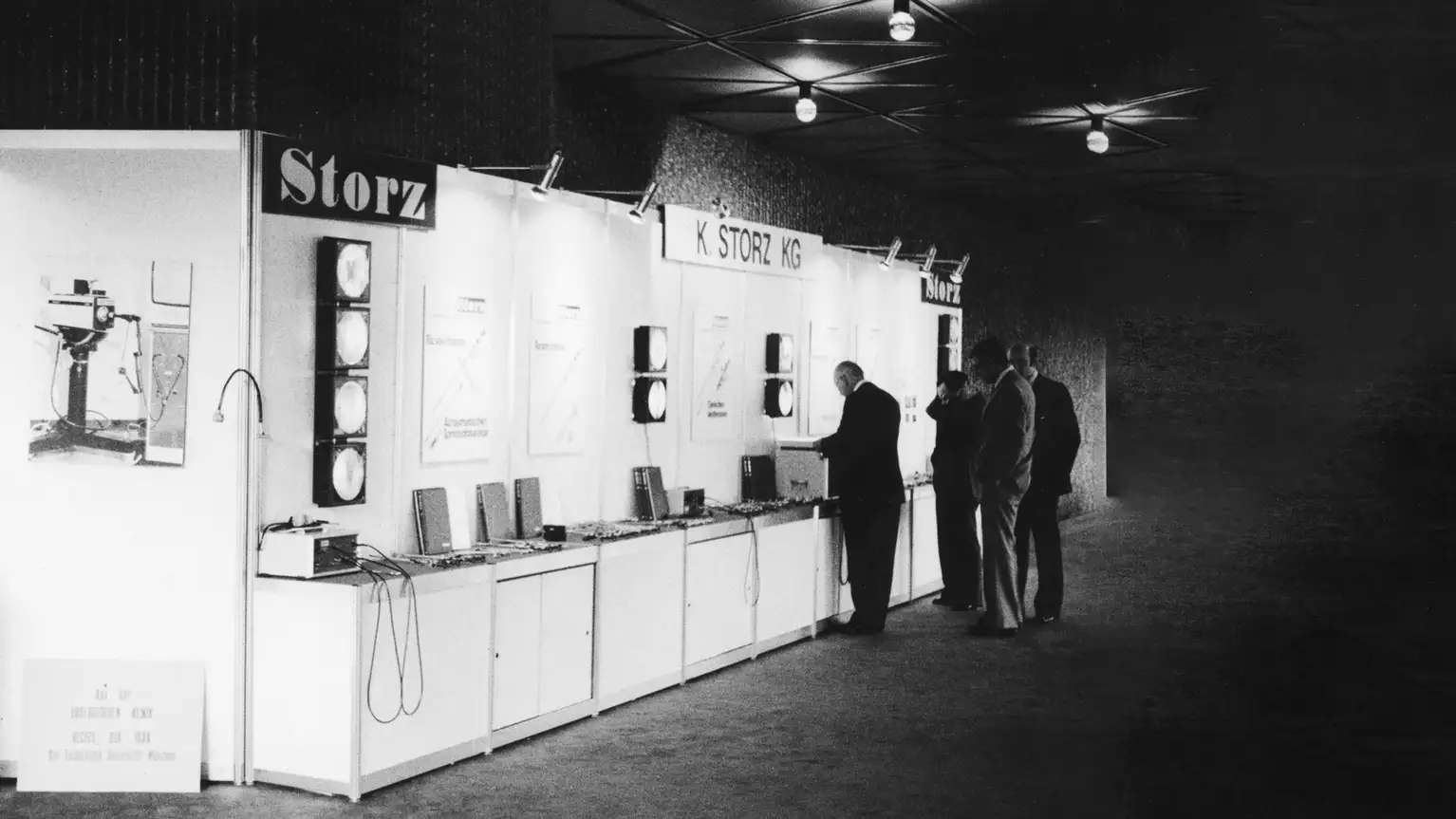INNOVATION SINCE 1945 Our Path to the Future
For more than eight decades, we at KARL STORZ have been shaping medicine with pioneering MedTech solutions. Our innovations have set new standards, and we continue to tackle the challenges of clinical practice, ensuring that medical professionals worldwide can rely on our products and solutions.
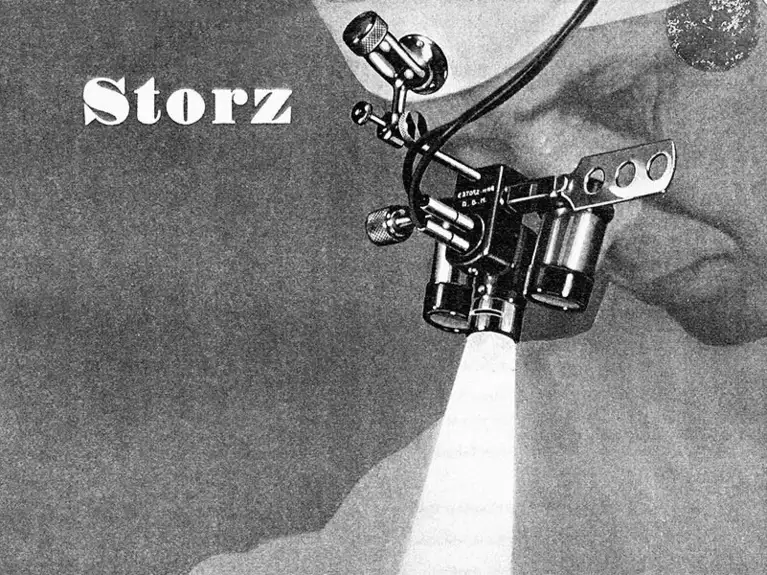
1945
Karl Storz establishes his company in Tuttlingen at the age of 34. The product range initially includes instruments, headlights and binocular loupes for otorhinolaryngology.
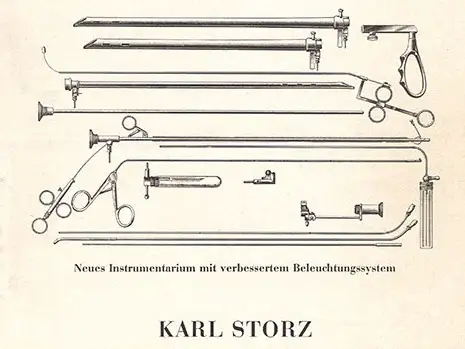
1952
Instrument set for bronchoscopy is modernized and accessories, e.g., for optical biopsies, are added. This marks the beginning of endoscopy at KARL STORZ; the first endoscopes with a traditional lens system were developed and produced by Karl Storz in the early 1950s.
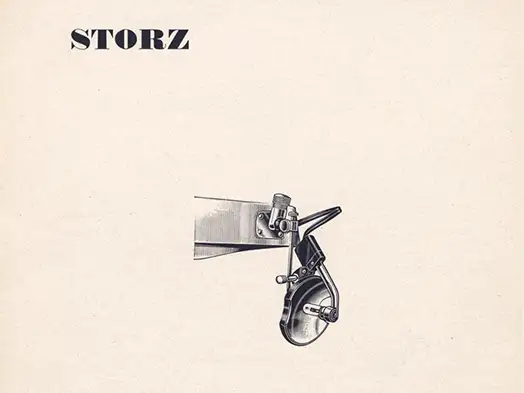
1955
CLAR55 forehead lamp with 55 mm concave reflector and tungsten bulb – presented for the first time in 1955 at the ENT Congress in Constance and still the best selling model among “warm light” forehead lamps to this day.
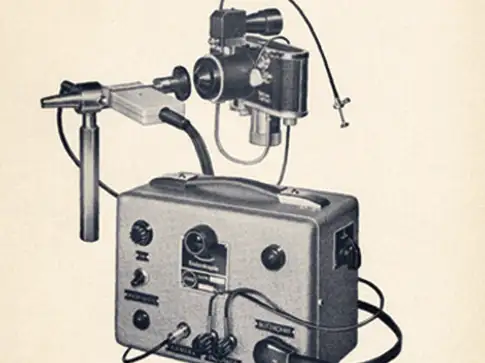
1956
The first extracorporeal electron flash device allows endoscopic photography in unprecedented quality.
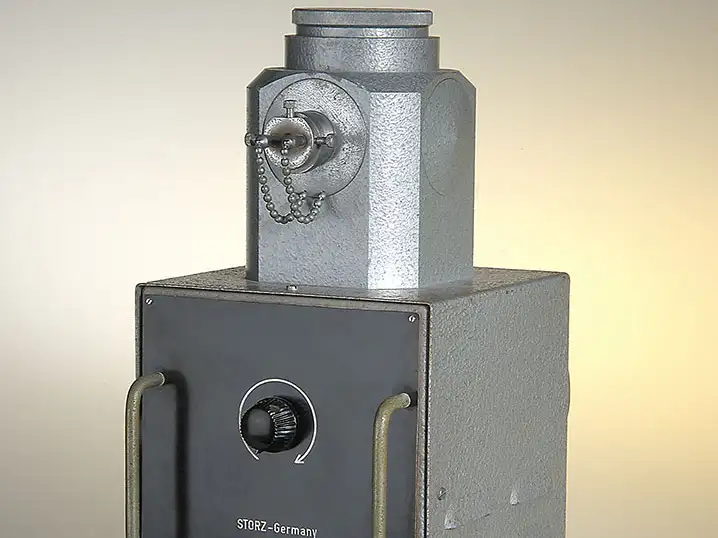
1960
The development of the cold light source marks the beginning of a new chapter in the history of the company and endoscopy.
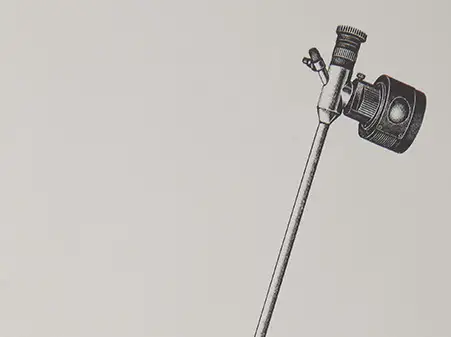
1962
First flexible gastroscope "Universal" with cold-light mirror Illumination
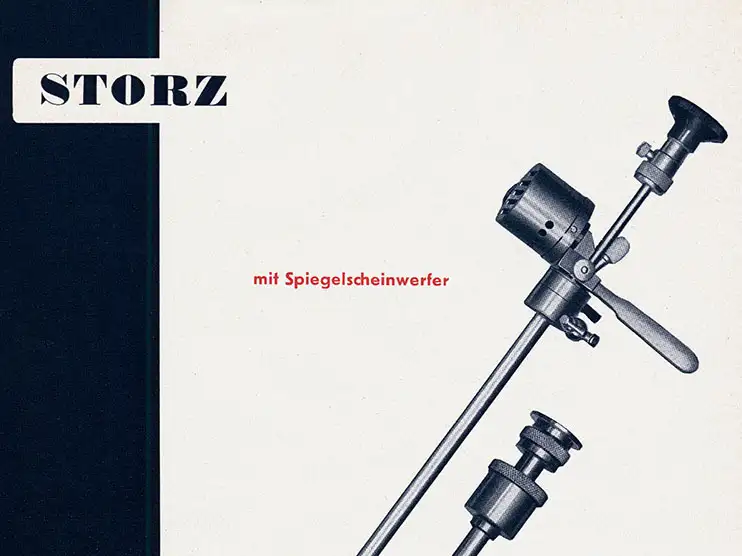
1962
Laparoscopy starts to be used in internal medicine.

1962
A further milestone is the introduction of the HOPKINS® rod lens system.

1969
Lithotripter for shattering bladder stones.
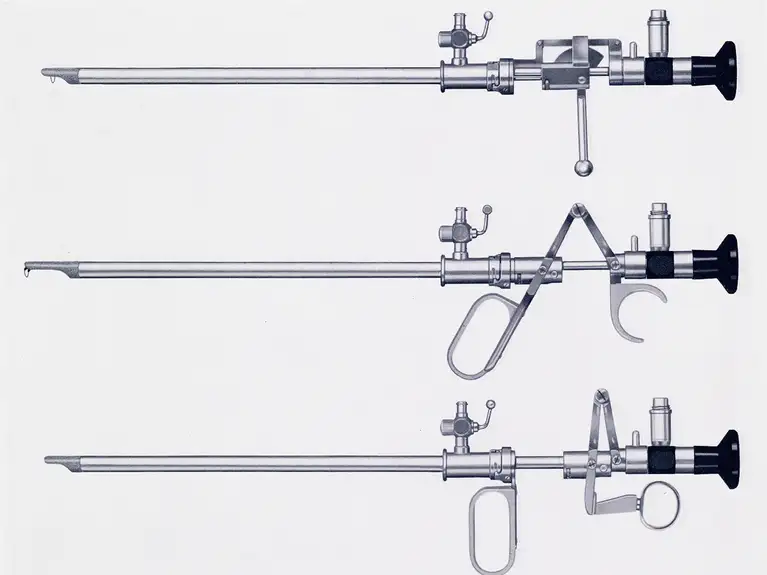
1969
KARL STORZ presents the first resectoscopes for the transurethral treatment of benign prostate hyperplasia and bladder tumors.

1970
Ultrasonic lithotripter according to LUTZEYER for breaking up stones in urology.

1971
KARL STORZ Endoscopy-America, Inc., Los Angeles, is established.

1971
Foundation of a manufacturing company in Schaffhausen, Switzerland.

1973
The CLAR73 headlamp is introduced at the World Congress of Otorhinolaryngology in Venice, Italy.

1973
Already offering a comprehensive product range, KARL STORZ contributes to the development of diagnostic and operative gynecological endoscopy

1974
Laryngopharyngoscope according to BERCI-WARD.

1974
Beginnings of diagnostic arthroscopy

1975
Articulated telescope for image transmission from the endoscope optics to a photo, video, or TV camera as well as for the simultaneous viewing of endoscopic procedures by two people

1976
Stone punch according to MAUERMAYER for lithotripsy under visual control
_rdax_767x575_60.webp)
1976
KARL STORZ develops its own small and easy-to-handle endocamera with associated electronic flash.

1977
Beginnings of functional endoscopic sinus surgery (MESSERKLINGER)

1977
First high-frequency surgery unit with automatic control of coagulation and cutting current

1980
The Department of Medicine of the University of Geneva awards Karl Storz the Prix mondial Nessim Habif de chirurgie for his work and his development of diagnostic endoscopes.

1980
First stroboscopy unit "STORZ 8000" for visualizing vocal fold vibration

1980
HAMOU® Micro Contact Hysteroscope I: Thanks to its small diameter of only 5 mm, outpatient contact hysteroscopy can for the first time be performed at magnifications up to 150x.

1980
First endoscopic ureterorenoscopy (PÉREZ-CASTRO ELLENDT).

1981
Beginnings of percutaneous nephrolithotomy (PCNL) for endoscopic kidney stone removal using a new procedure (ALKEN).

1982
KARL STORZ fiberscopes for flexible bronchoscopy.

1983
First KARL STORZ tube camera

1983
The KARL STORZ portfolio is expanded by the first electrical shaver for arthroscopy.

1984
With up to 80x magnification, the Contact Hysteroscope II acc. to HAMOU® allows direct microscopic examination of tissue during hysteroscopy.

1985
Karl Storz is granted a honorary doctorate degree by the medical faculty of Marburg University.

1986
Electrohydraulic lithotripsy system for treating ureteral, kidney, and bladder stones.

1987
Advance of functional endoscopic sinus surgery, later abbreviated as FESS (Functional Endoscopic Sinus Surgery).

1987
The first laparoscopic removal of a gall bladder marks the beginning of minimally invasive surgery.

1988
Entry into the spinal endoscopy market with the set acc. to VOGL for endoscopically controlled nucleotomy.

1988
Uretero-fiberscope for minimally invasive use in the ureter.

1988
First KARL STORZ 1-chip video camera model, Endovision 534

1989
KARL STORZ Endovision (Charlton, Massachusetts) is founded.

1990
KARL STORZ Imaging is founded in Goleta, California.
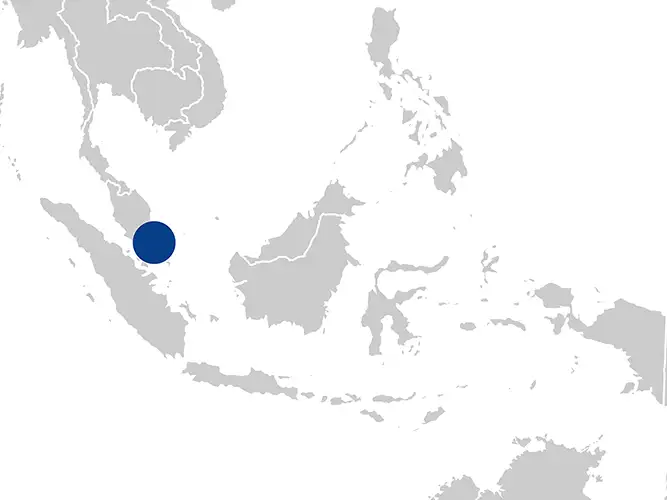
1990
Our first sales subsidiary in Asia is established in Singapore.

1991
The first analog 3-chip video camera achieves previously unmatched brilliance of the endoscopic images.

1992
Launch of the first dismantling KARL STORZ TAKE-APART® hand-held instruments for laparoscopy.

1992
The newly launched KARL STORZ TELECAM features a parfocal zoom that allows selection of image detail without losing sharpness.

1993
The STEINER electromechanical morcellator revolutionizes the laparoscopic removal of benign tissue.

1994
First endoscopy-assisted middle ear surgery with KARL STORZ instruments (THOMASSIN).

1995
The company founder Karl Storz is awarded the Cross of the Order of Merit of the Federal Republic of Germany.

1995
In recognition of his lifetime achievements, Karl Storz receives the "Pioneer in Endoscopy Award" from the Society of American Gastrointestinal and Endoscopic Surgeons.

1995
Photodynamic diagnosis (PDD) and autofluorescence (AF) fundamentally improve early tumor diagnostics using optical fluorescence and marker substances in the urinary bladder and bronchi.

1996
Dr. med. h. c. Karl Storz dies at the age of 85. Company management is seamlessly transferred to his daughter, Sybill Storz.

1997
Introduction of the needle arthroscope for the diagnostics of inflammatory rheumatic diseases.

1998
First curved instruments for minimally invasive thoracoscopic procedures according to CUSCHIERI

1998
Launch of the Video Mediastinoscope according to LERUT with DCI camera system (DCI = Direct Coupled Interface).

1998
Launch of the CLICKLINE forceps generation as an advancement of the 10 mm and 5 mm TAKE-APART® hand-held instruments for laparoscopic procedures.

1998
With the GAAB ventriculoscope, KARL STORZ revolutionizes ventriculoscopy even before the new millennium.

1998
Market launch of the spinoscope with movable distal tip for endoscopic laser foraminoplasty.

1998
At the MEDICA trade fair, KARL STORZ introduces the KARL STORZ OR1™ including SCB (STORZ Communication Bus).

1999
A logistics and training center is opened in Tuttlingen.

1999
CLICKLINE instruments are now also available in the diameters 3.5 mm, 3 mm, and 2 mm, making them suitable for use in pediatric laparoscopic surgery.

1999
Swing prism for industrial endoscopy: A large field of observation can now be achieved with rigid borescopes thanks to a variable direction of view.

2000
With the first miniature endoscope specially designed for removing stones from the salivary duct, minimally invasive surgery gains a new dimension in this field as well.

2000
KARL STORZ launches the first mobile documentation system in the field of industrial endoscopy.

2001
Launch of ROBI® rotating bipolar scissors and forceps.

2001/2002
Flexible endoscope with distal chip (5 mm and 8 mm).

2002
Sybill Storz receives the "Lifetime Achievement Award" of the International Society for Gynecologic Endoscopy (ISGE).

2002
With the foundation of a sales company in South Africa, KARL STORZ now has its own subsidiary on the African continent.

2002
Macintosh intubating video laryngoscope with integrated camera technology.

2002
Launch of the BETTOCCHI® Office-Hysteroscope on the basis of a HOPKINS® rod lens telescope, with a diameter of only 2.0 mm.

2002
KARL STORZ introduces the digital camera system IMAGE1. In addition to standard-definition camera heads, pendulum and DCI camera heads are available.

2003
Introduction of video endoscopes in gastroenterology.

2003
KARL STORZ starts working on 3D technology at an early stage, resulting in the very early model TRICAM® 3D. Based on the technologies available at the time, an active 3D system with two optical paths is developed. The shutter glasses are still connected to the 3D monitor by cables.

2003
VIDEOSCOPE 2-point measuring system permits simultaneous measurement and documentation during inspections with industrial endoscopes.

2004
Sybill Storz receives the Diesel Medal of the German Institute for Inventions. The German Society of Urology honors Sybill Storz as a promoter of urological science.

2004
Video bronchoscopes for flexible bronchoscopy.

2004
Simulator for urological procedures and fluorescence procedures

2004
Production of the first laparoscopy set for operations on elephants.

2005
KARL STORZ celebrates its 60-year anniversary.

2005
Sybill Storz receives the Veuve Clicquot Business Woman of the Year Award.

2005
With the seal of the German Society of Surgery, Sybill Storz is honored for her achievements in medical technology.

2005
The Russian Academy of Medical Sciences grants an honorary doctorate to Sybill Storz.

2005
Admitted to the Legion of Honor as ‘Chevalier de la légion d’honneur’ by decree of the French President, Jacques Chirac, in Paris, France.

2005
Launch of the LED cap lamp system.

2005
The ROTOCUT G1 morcellator with its revolutionary hollow shaft motor sets new standards in ergonomics and power for laparoscopic morcellation.

2005
Pediatric system for the urological treatment of children.

2005
With the CALCULASE Desktop-Holmium-Laser, we have created an efficient and space-saving unit.

2005
Bipolar resectoscope including AUTOCON® HF unit for gynecology and urology.

2005
Extremely accurate measurement in any starting position thanks to MULTIPOINT measuring techniques in the stored image, live image, and in image comparison mode.

2006
The European Council for Women, Businesses and Commerce (Conseil Européen Femmes Entreprises et Commerce – CEFEC) in Paris awarded Sybill Storz as Businesswoman of the Year 2006.

2006
The medical faculty of the University of Tübingen bestows an honorary doctorate on Sybill Storz.

2006
The University of Dundee bestows an honorary doctorate "Doctor of Laws" on Dr. med. h. c. Sybill Storz.

2006
Launch of the GASTRO PACK® as a portable endoscopy unit for versatile and independent use.

2006
Innovative Miniature Nephroscope System acc. to NAGELE for gentle kidney stone treatment.

2006
Photodynamic diagnosis (PDD) – visualizing the invisible with continuously improved technology: 3-chip endocamera with outstanding light sensitivity and superior color contrast

2007
Official appointment as "Chevalier de la légion d’honneur" by the French president Jacques Chirac in Paris, France.

2007
Sybill Storz receives an honorary doctorate from the medical school of Timisoara, Romania.

2007
With the foundation of our own sales company in Australia, KARL STORZ now has subsidiaries on five continents.

2007
KARL STORZ becomes a partner of the technology initiative MoBiTech "Molecular Imaging – images for healthy life" funded by the German Federal Ministry of Education and Research.

2007
Presentation of the ENDOCAMELEON® swing prism telescope with variable direction of view for laparoscopic procedures (10 mm).

2007
With IMAGE 1 HUB™ HD, KARL STORZ launches the first medical FULL HD camera worldwide.

2008
Launch of the C-MAC® – the 4th generation KARL STORZ video laryngoscope, now with CMOS Technology.

2008
Video bronchoscopes for flexible autofluorescence diagnostics.

2008
Presentation of the Navigation Panel Unit NPU, the portable optical navigation system for ENT surgery, at the DGHNO's 79th annual meeting in Bonn, Germany.

2009
The KARL STORZ operating room concept is awarded in the “365 Landmarks in the Land of Ideas” contest for the topic “Gentle surgery in the intelligent operating room”.

2009
ANUBIS project for NOTES procedures. Development for endoluminal and transluminal procedures.

2010
The Society for General and Visceral Surgery awards Sybill Storz its Pichlmayr Medal. The same year, Sybill Storz also recieves an honorary citizenship of Ludwig-Maximilian University in Munich.

2010
Knight's Cross of the Order of Merit of the Federal Republic of Germany presented to Dr. h. c. mult. Sybill Storz.

2010
Launch of the currently thinnest flexible uretero-renoscope with chip-on-the-tip-technology.
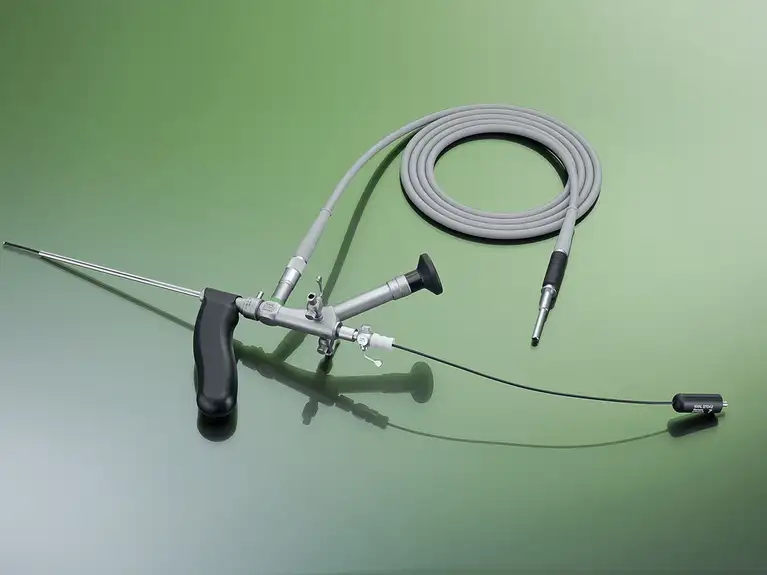
2010
VAAFT – instruments for video-assisted anal fistula treatment.
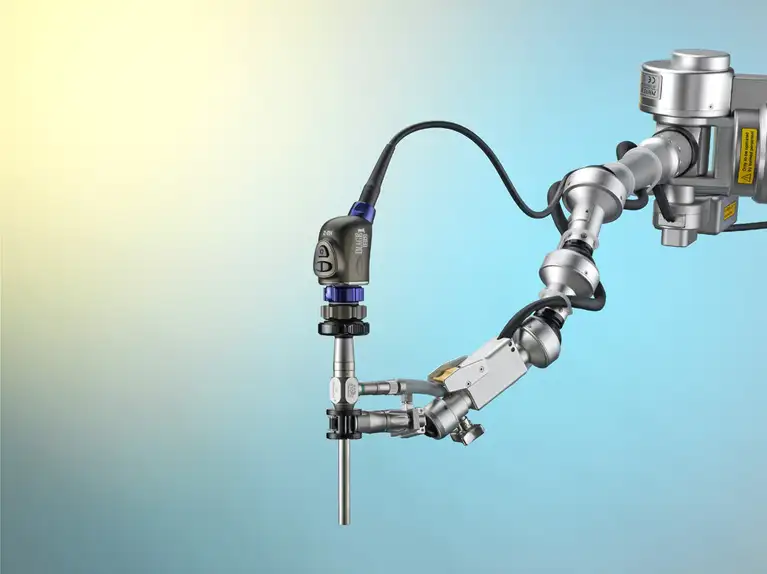
2010
With VITOM® Spine, KARL STORZ offers a new extracorporeal visualization system for open surgery with minimal access. Positioned at a convenient distance above the surgical site, the VITOM telescope permits illumination and the very natural and plastic visualization of the surgical field, while simultaneously supplying an excellent depth of field far superior to that offered by surgical microscopes. This development creates a new business segment, and synergies with endoscopy can be optimally exploited.
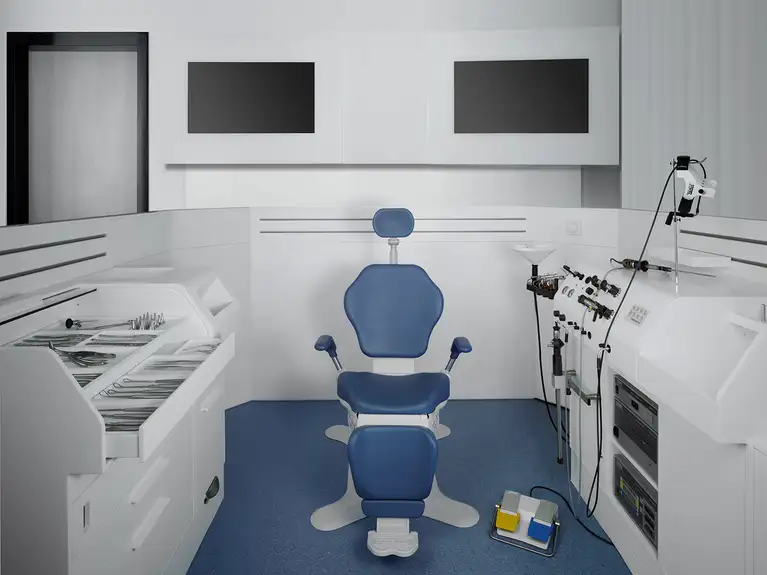
2010
Launch of the integrated treatment room KARL STORZ OFFICE1.
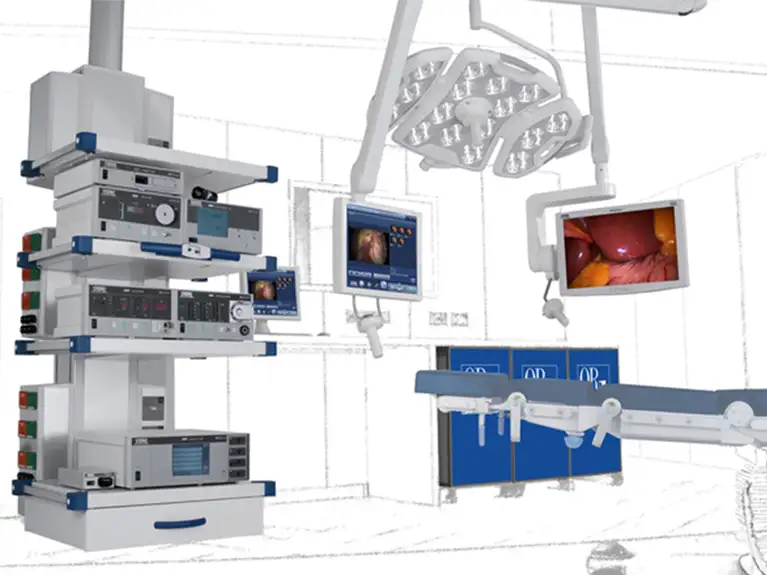
2010
OR1™ is now available with a new and improved design: OR1 NEO®
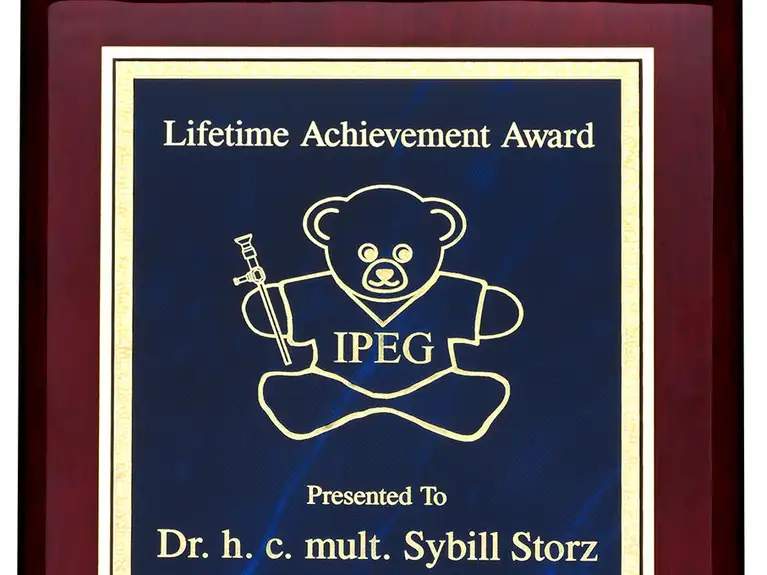
2011
Sybill Storz receives the Lifetime Achievement Award of the International Pediatric Endosurgery Group.
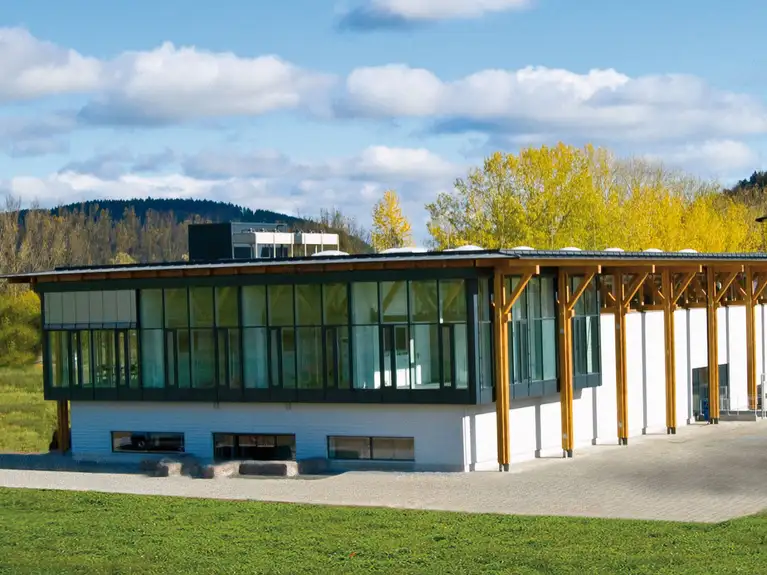
2011
Opening of the KARL STORZ Visitor Centre: Current innovations in 20 specialties of human medicine as well as products from veterinary medicine and the Industrial Group are presented on 1400 square meters. In addition, the integrated system solutions associated with OFFICE1 and OR1™ are displayed in a clinical pathway.
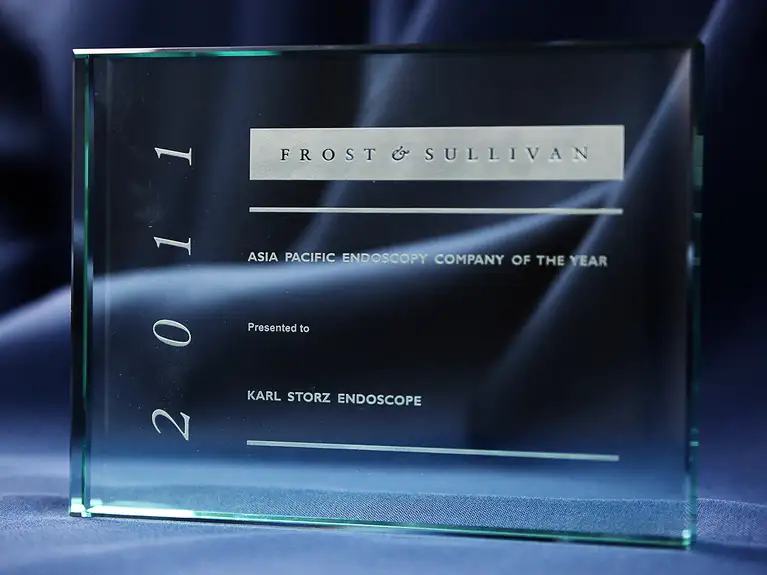
2011
Frost & Sullivan names KARL STORZ "Endoscopy Company of the Year" for the Asia-Pacific region.
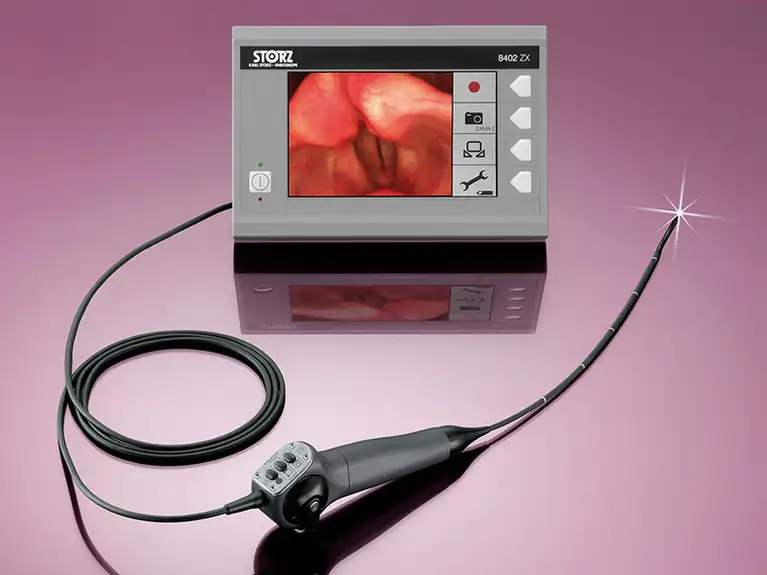
2011
Introduction of CMOS video technology in the specialties anesthesiology, otorhinolaryngology, and urology.
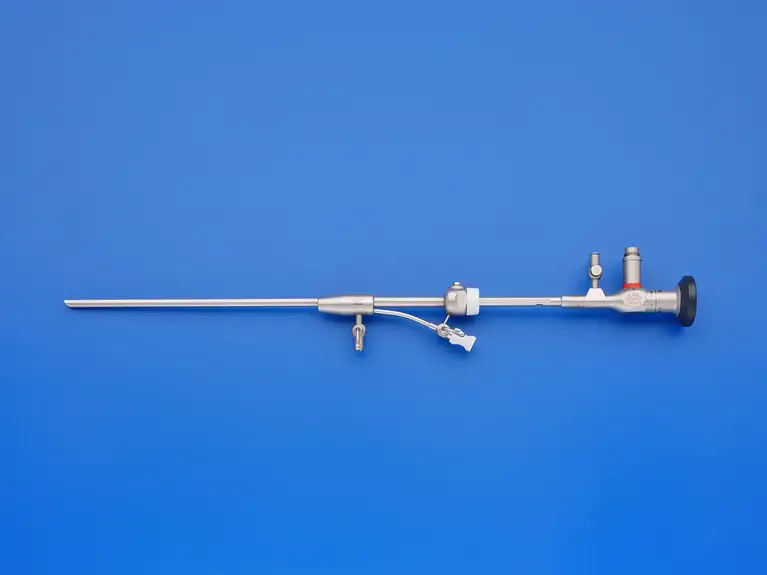
2011
Market launch of the CAMPO Compact Hysteroscope with sliding shaft system for atraumatic primary access.
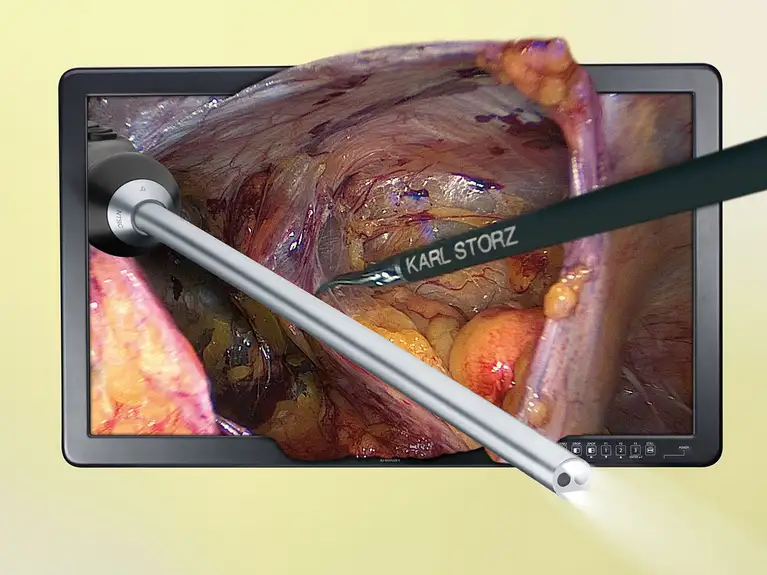
2011
3D camera system for surgeons: 3D vision and easy orientation with excellent depth perception. The system consists of the video laparoscope TIPCAM®1 3D (0° and 30°), a 3D camera control unit, a 3D monitor, and polarized 3D glasses.
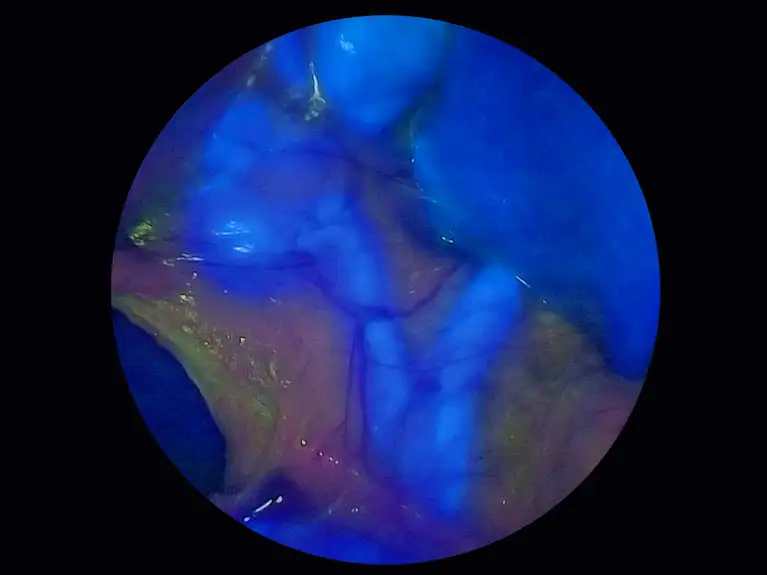
2011
ICG (indocyanine green) fluorescence in HD Quality.
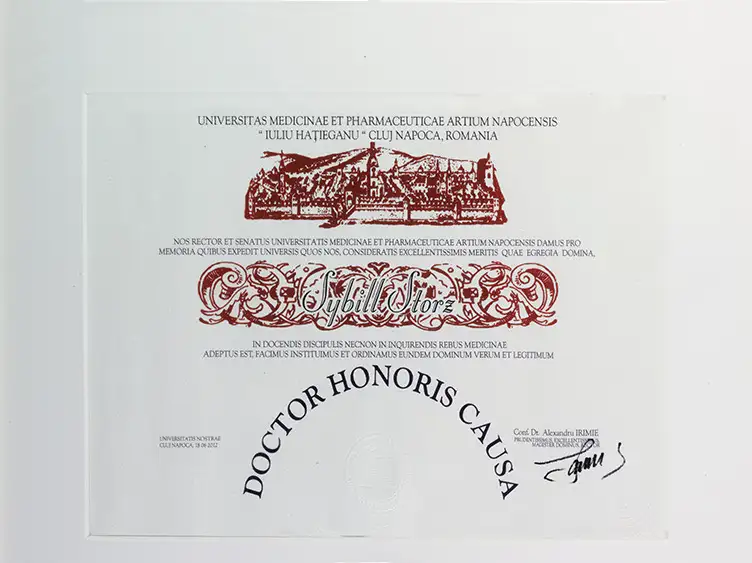
2012
Sybill Storz receives an honorary doctorate from the medical school of Cluj-Napoca, Romania.
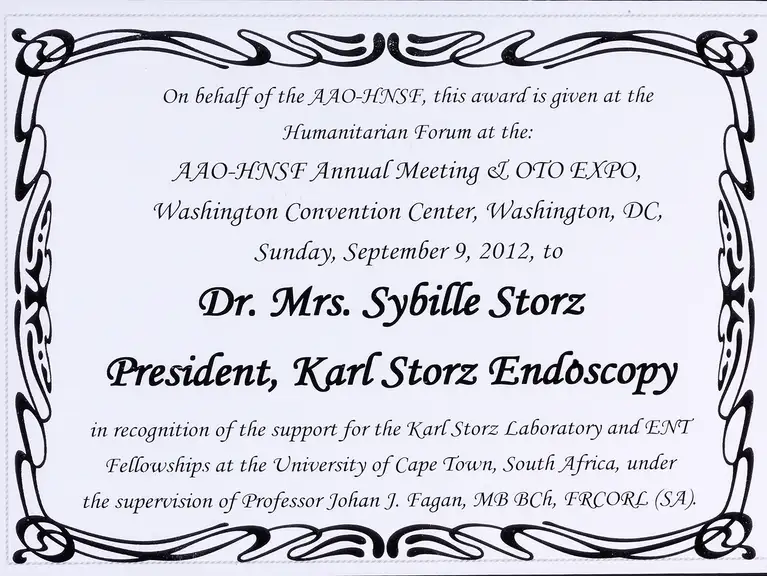
2012
Sybill Storz's social commitment to promoting access to medical care is honored with the Humanitarian Award of the American Academy of Otolaryngology – Head and Neck Surgery.
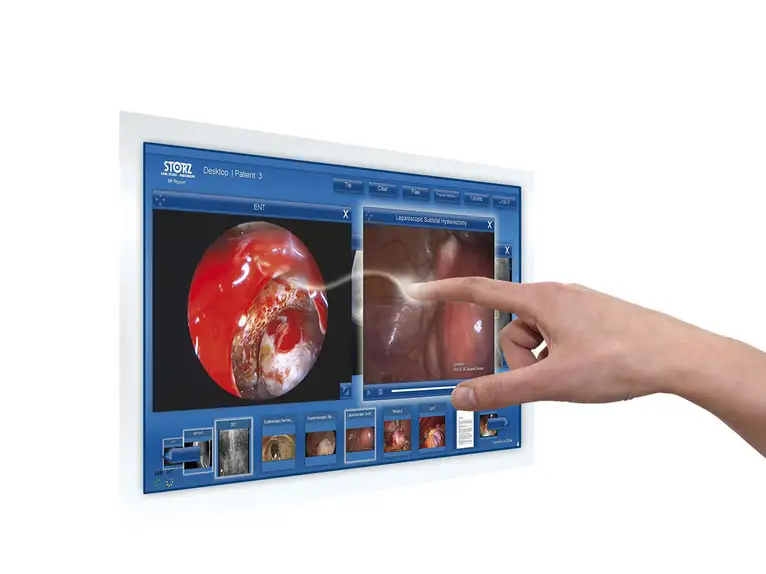
2012
The KARL STORZ touchless gesture control system MI Report awarded in the "Land of Ideas" contest.
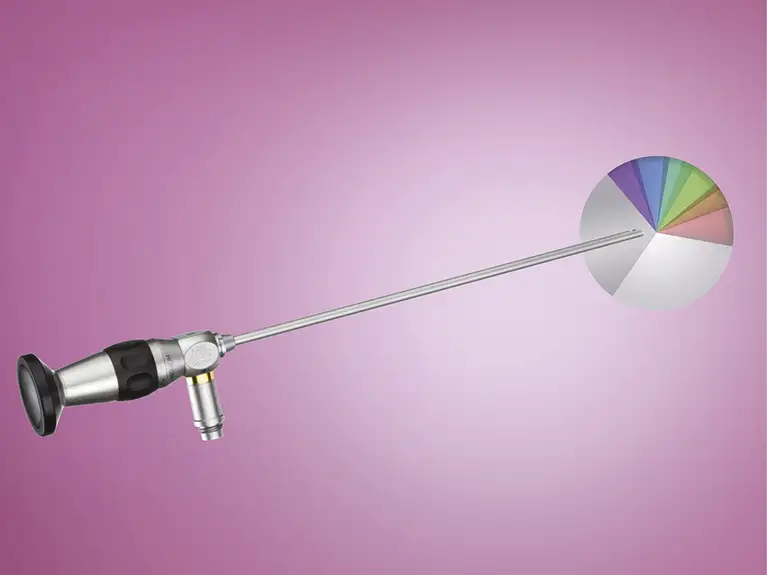
2012
ENDOCAMELEON® 4 mm – the rigid endoscope with variable direction of view is now also available for otorhinolaryngology and arthroscopy.
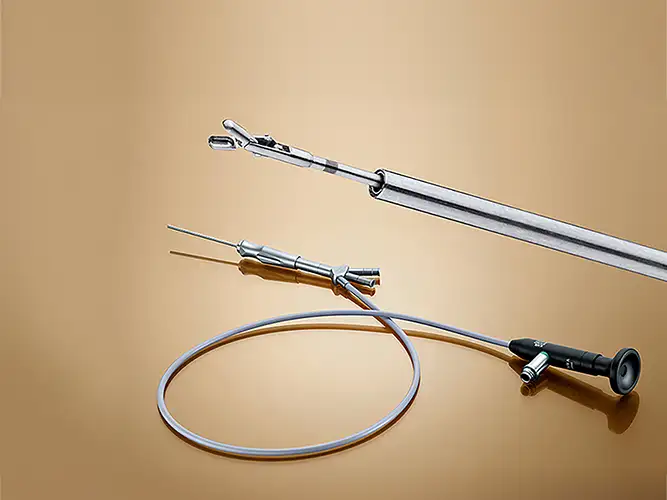
2012
The ALL-IN-ONE TMJ Arthroscope facilitates TMJ arthroscopy by eliminating the difficult triangulation step.
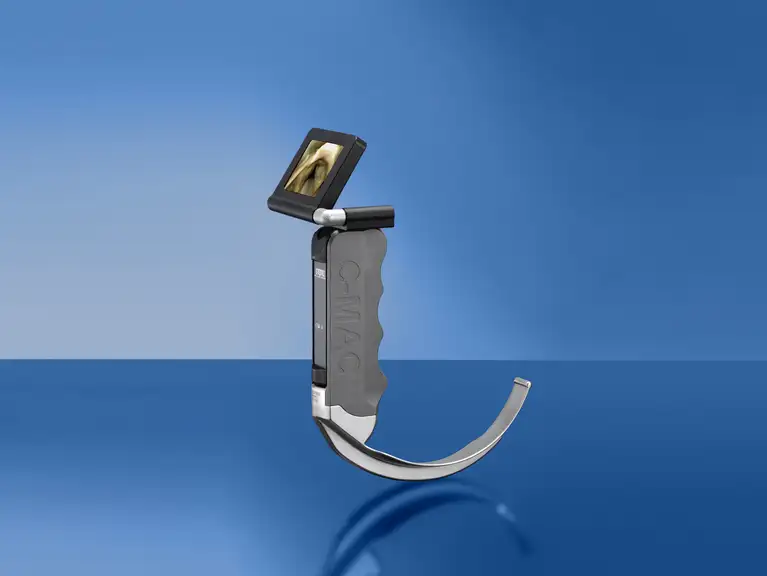
2012
Introduction of the C-MAC® with Pocket Monitor.
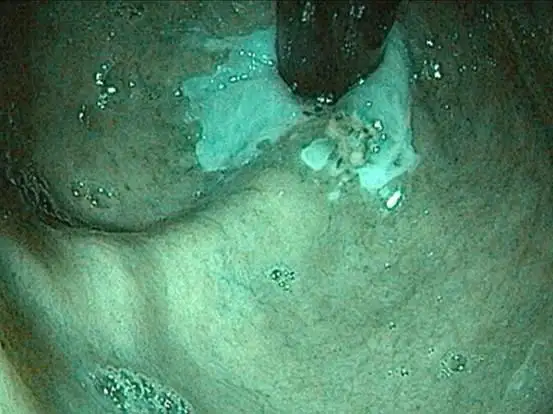
2012
High-definition video endoscopes for gastroenterology are equipped with an innovative visualization system that provides a white light mode as well as three defined spectral ranges for specific applications.
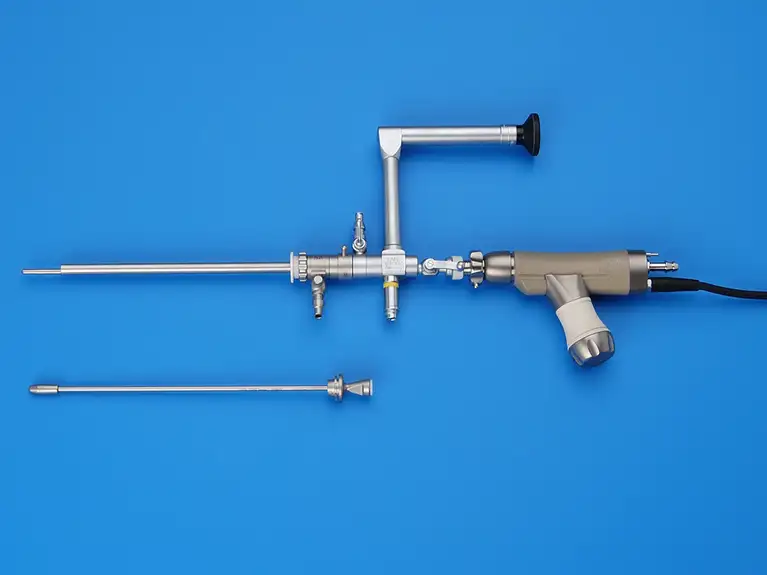
2012
The Intrauterine Bigatti Shaver (IBS®) now permits the mechanic resection of hysteroscopic findings.
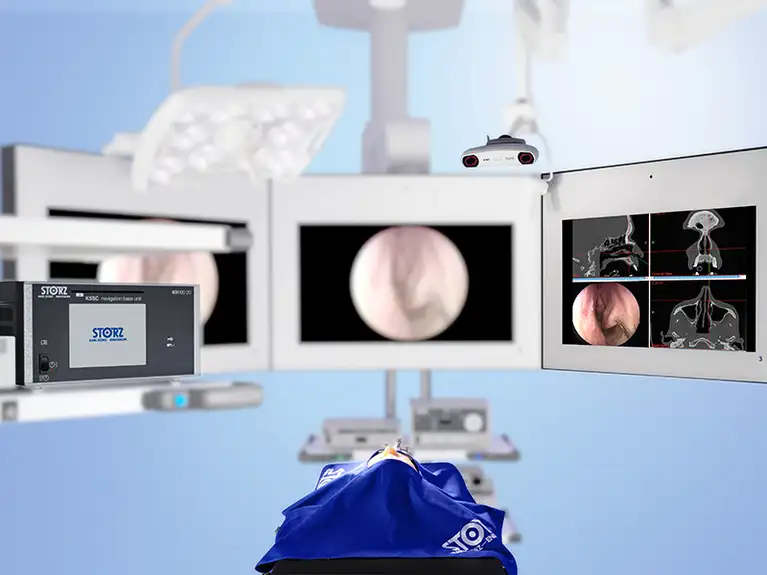
2012
Presentation of the Navigation Base Unit NBU – a navigation system with FULL HD resolution for easy integration into the OR or equipment cart.
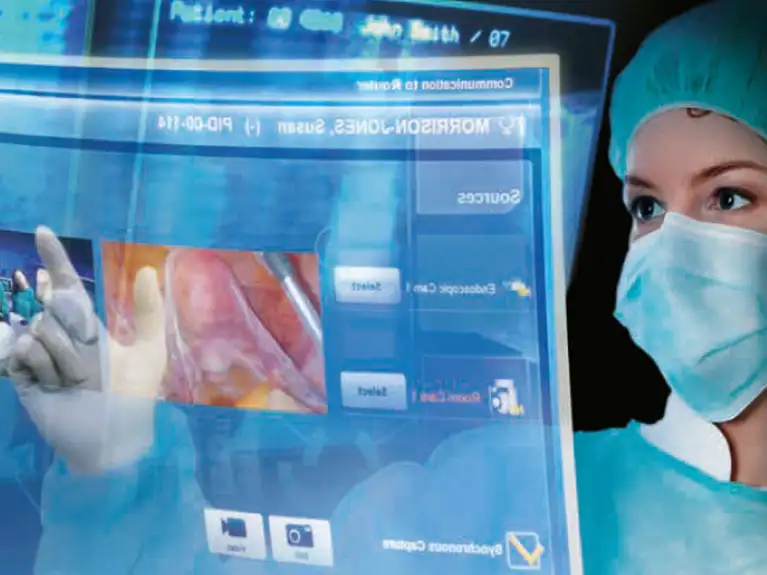
2012
KARL STORZ OR1 FUSION® – the newest generation of the integrated operating room on the basis of IP technology.
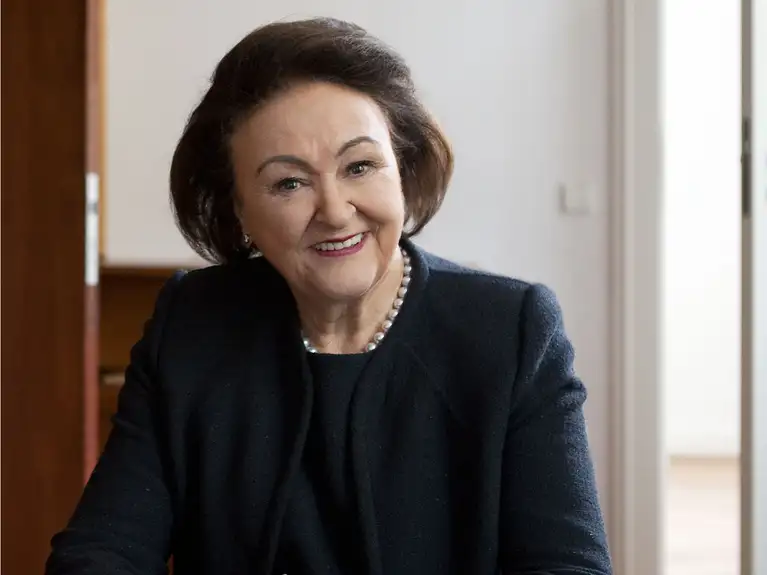
2013
Sybill Storz is appointed honorary member of the German Society of Oto-Rhino-Laryngology, Head and Neck Surgery.
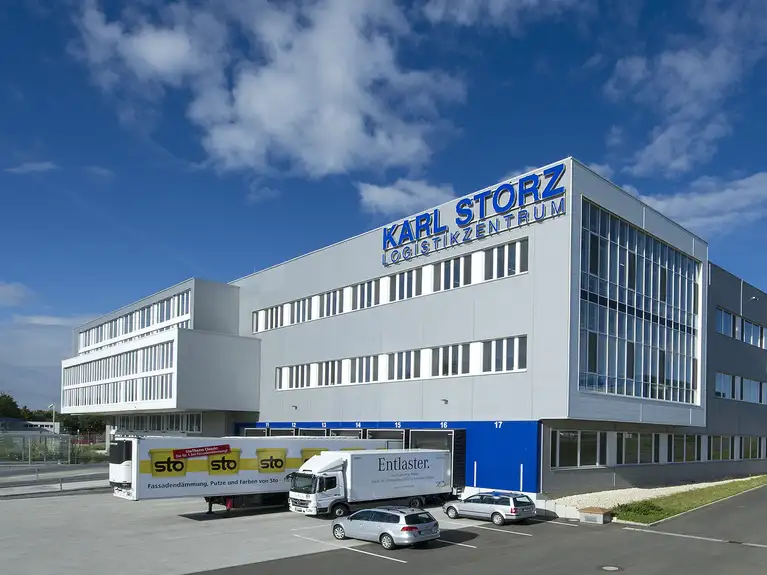
2013
Opening of the new KARL STORZ logistics center in Neuhausen ob Eck (Tuttlingen county).
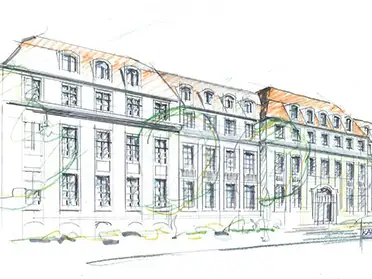
2013
Opening of the KARL STORZ Visitor and Training Centre Berlin following the successful renovation of the historic Empress Augusta Hospital.
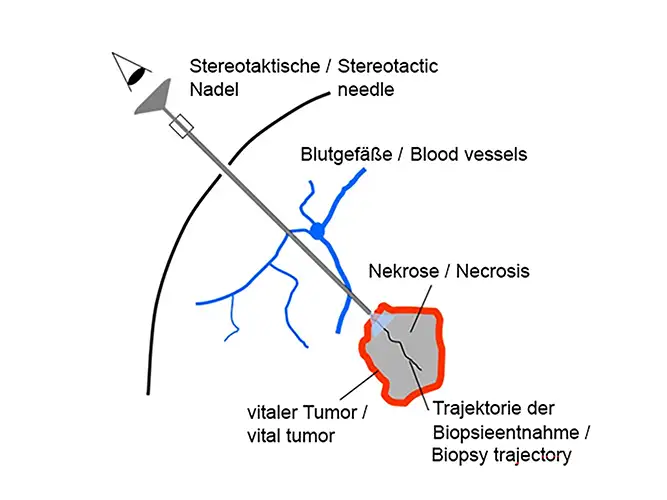
2013
KARL STORZ receives the DGBMT’s Prize for Patient Safety in Medical Engineering for developing a fluorescence endoscopic contact probe that increases precision in neurosurgical procedures.
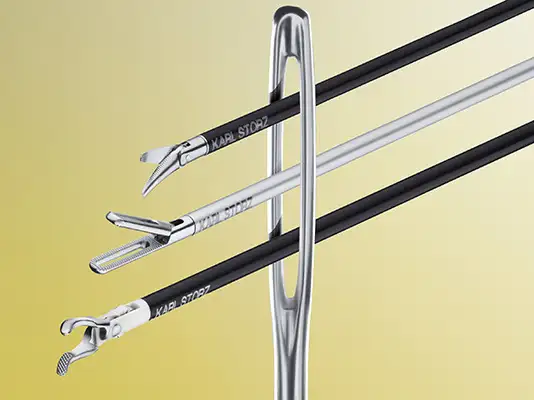
2013
3-part dismantling CLICKLINE instruments (3.5 mm diameter) for mini-laparoscopy.
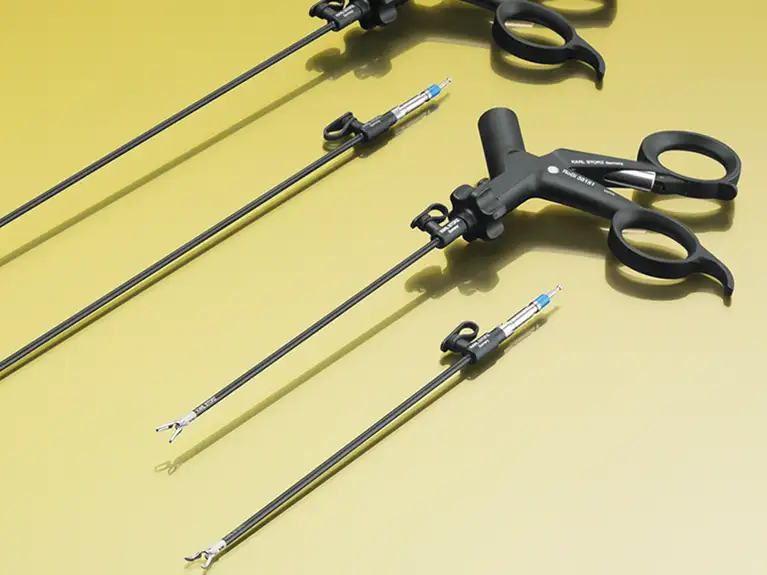
2013
Newly designed ROBI® instruments for mini-laparoscopy and pediatric laparoscopic surgery.
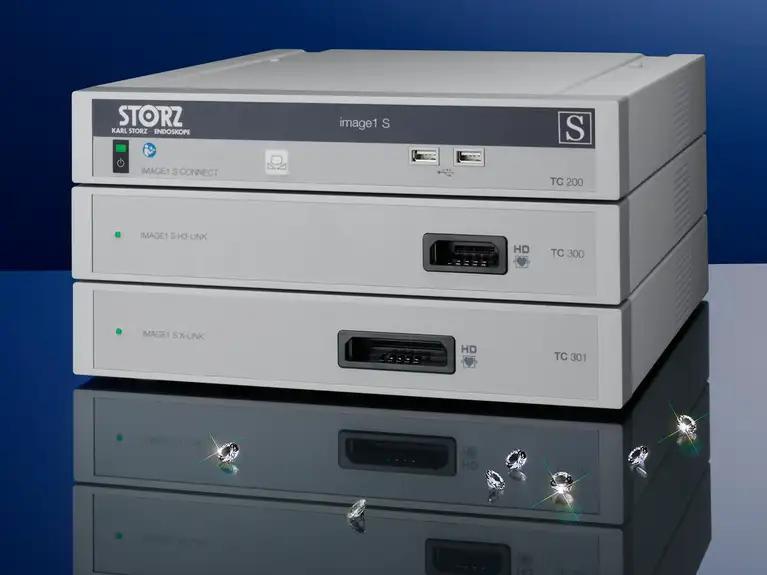
2013
IMAGE1 STORZ Professional Image Enhancement System:
Cutting-edge HD camera technology with innovative visualization options for diagnostics and operative procedures.
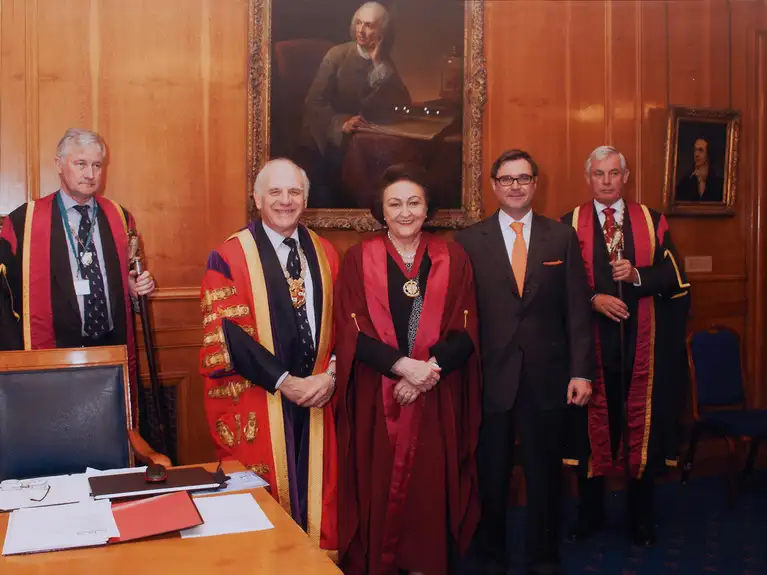
2014
Admission of Dr. h. c. mult. Sybill Storz to the "Court of Patrons" of the Royal College of Surgeons of England.
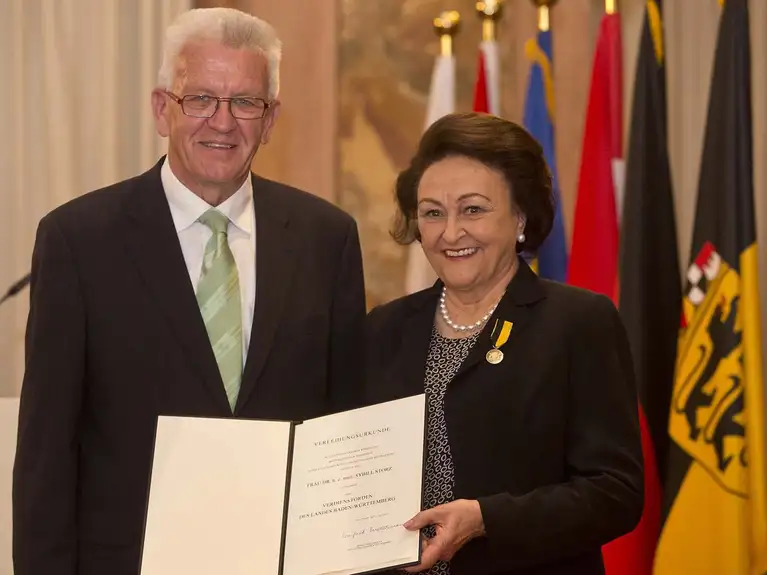
2014
Order of Merit of the state of Baden-Württemberg awarded to Dr. h. c. mult. Sybill Storz
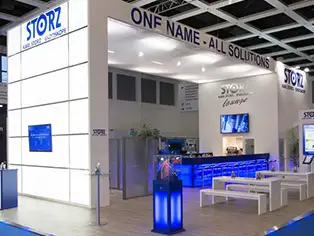
2014
A study conducted by the weekly business magazine WirtschaftsWoche finds KARL STORZ to be the most innovative among German small and medium-sized companies.
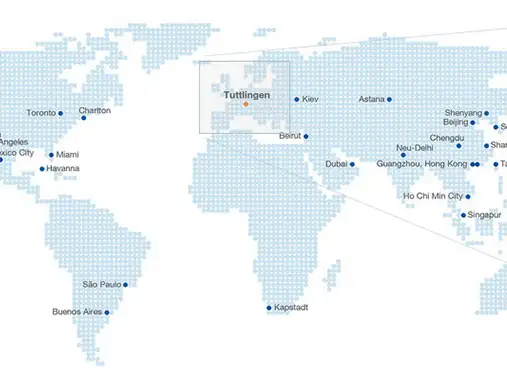
2014
With more than 50 subsidiaries domestically and abroad, KARL STORZ is committed to customer proximity and customer service worldwide.
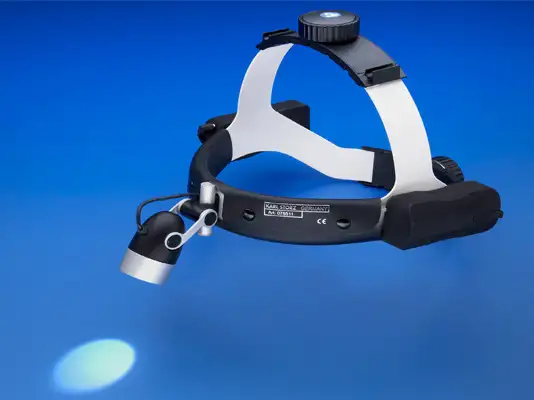
2014
Headlight KS70: with a previously unmatched runtime of up to 21 hours.
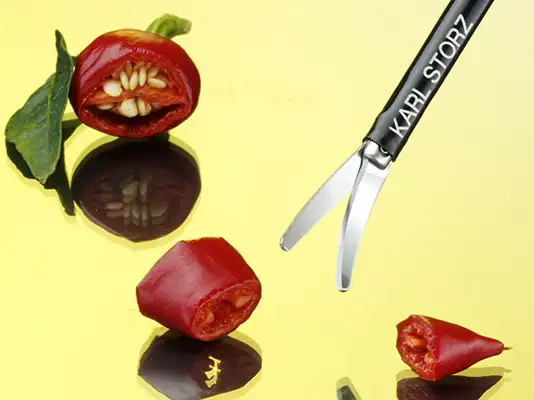
2014
Expansion of the CLICKLINE instrument line by single-use scissors.
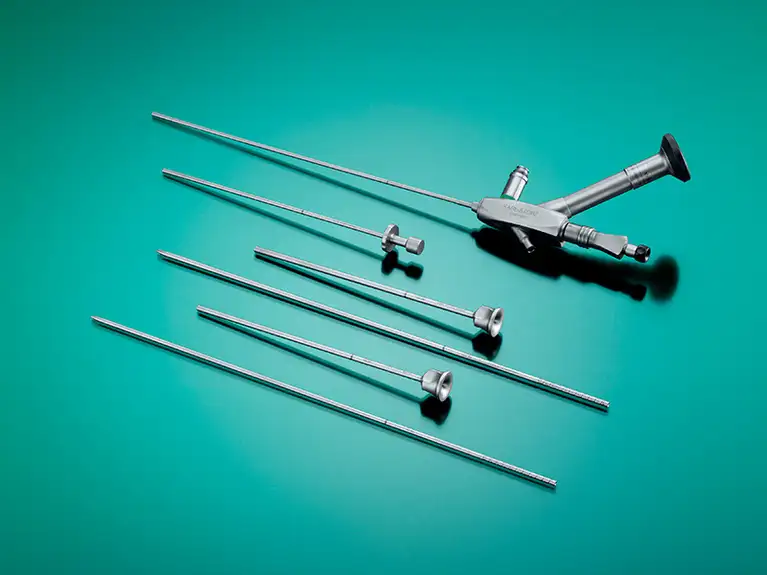
2014
A new generation of versatile pressure-controlled PCNL systems.
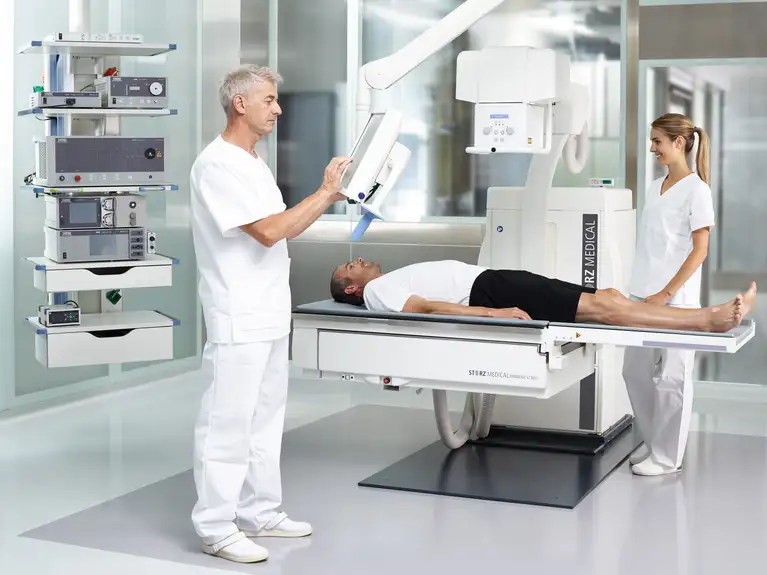
2014
Urological diagnostics and treatment from a single source with products from STORZ Medical and KARL STORZ.

2014
The modular endoscopic camera platform IMAGE1 STORZ Professional Image Enhancement System is expanded by 3D in FULL HD Quality.
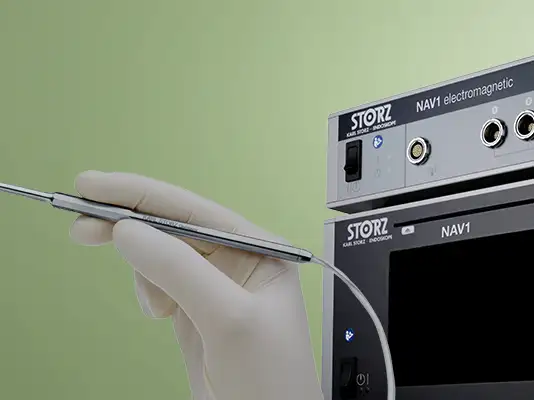
2014
The NAV1 ELECTROMAGNETIC is unveiled: the newest generation, space-saving, integrating, and economic navigation system with electromagnetic measurement technology.
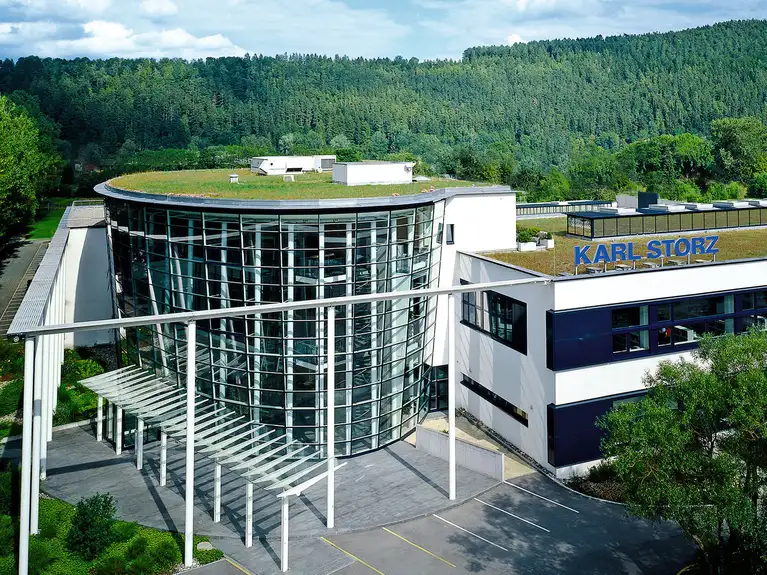
2015
For 70 years, our family business has stood for tradition, innovation, and quality in endoscopy.
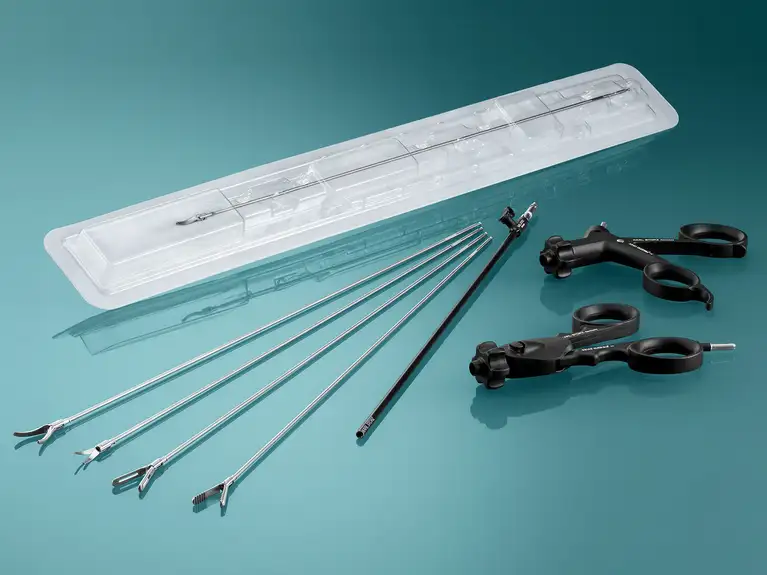
2015
Reusable endoscopy products are systematically supplemented by MTP single-use products for relevant applications.
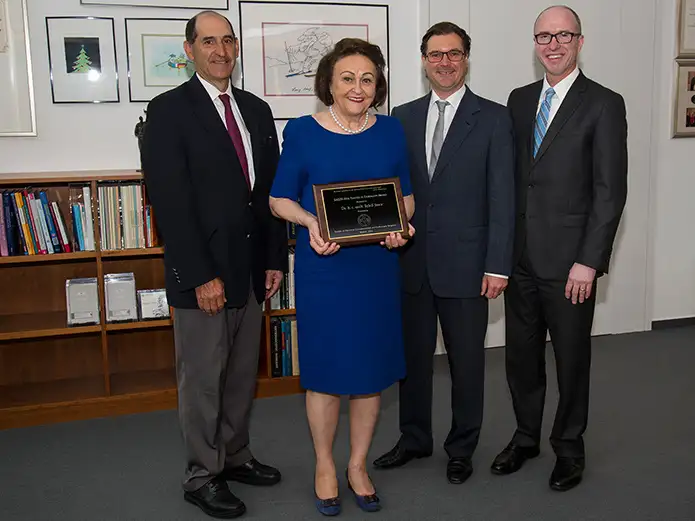
2016
Like her father, Sybill Storz is honored as "Pioneer in Endoscopy" by the Society of American Gastro-intestinal and Endoscopic Surgeons (SAGES), USA.
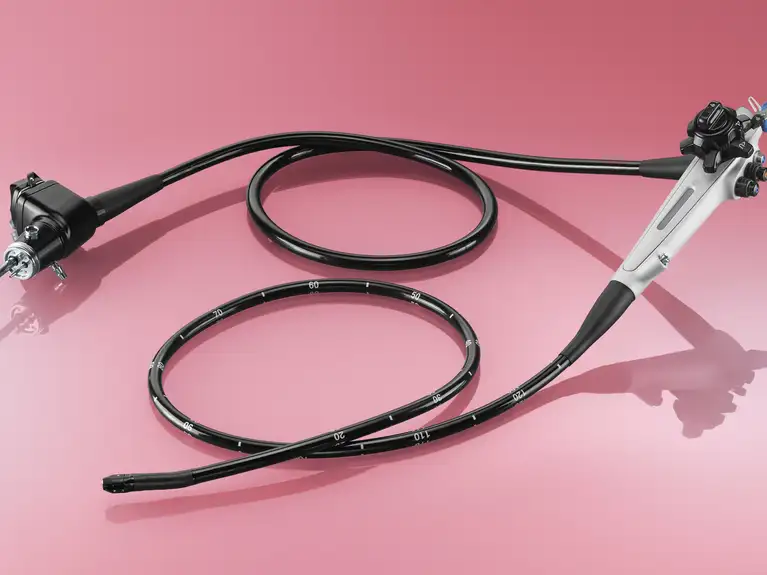
2016
The KARL STORZ duodenoscope with detachable Albarran module set new standards in reprocessing and thus offers additional benefits for hygiene.
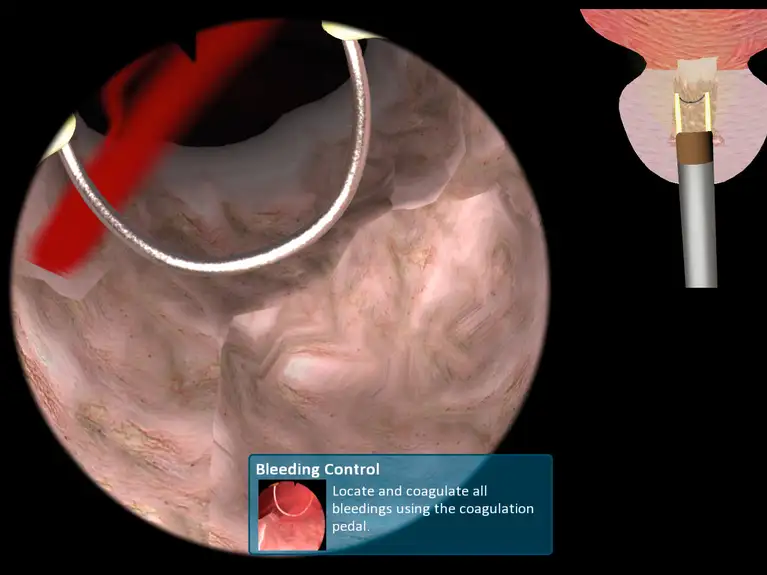
2016
With a multifunctional platform, KARL STORZ now offers virtual reality simulators for gynecology, urology, and arthroscopy.
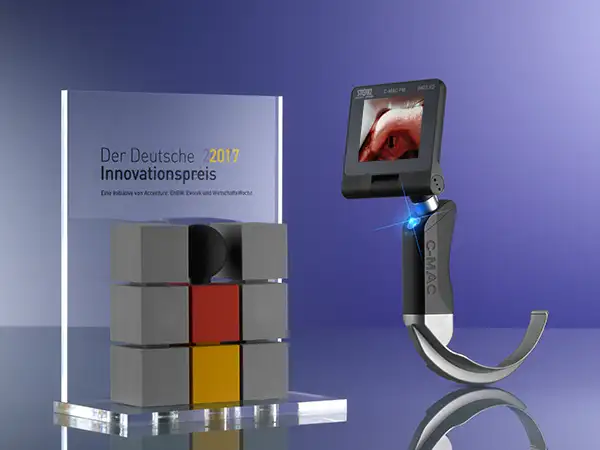
2017
The C-MAC® PM video laryngoscope wins the 2017 German Innovation Award.
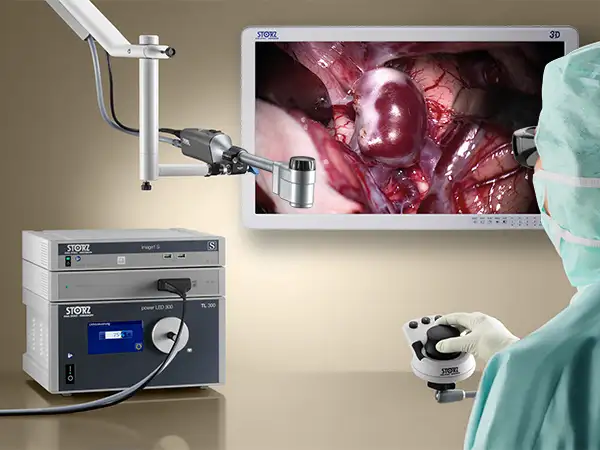
2017
The VITOM® 3D – 3D visualization for microsurgery and open surgery – awarded in the 2017 "Landmarks in the Land of Ideas".
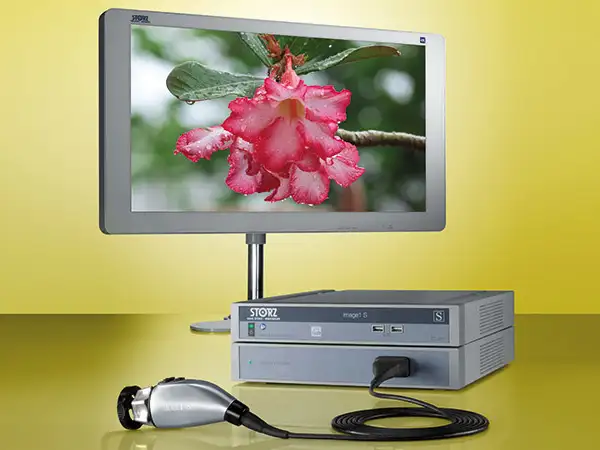
2018
Expansion of the modular endoscopic camera platform IMAGE1 S™ by components for native 4K imaging.
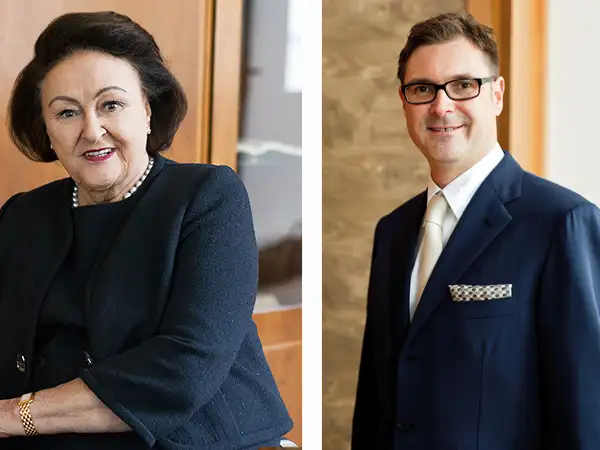
2019
As Chair of the Board, Dr. h. c. mult. Sybill Storz steps back from executive duties to make her son,
Karl-Christian Storz, sole managing director.
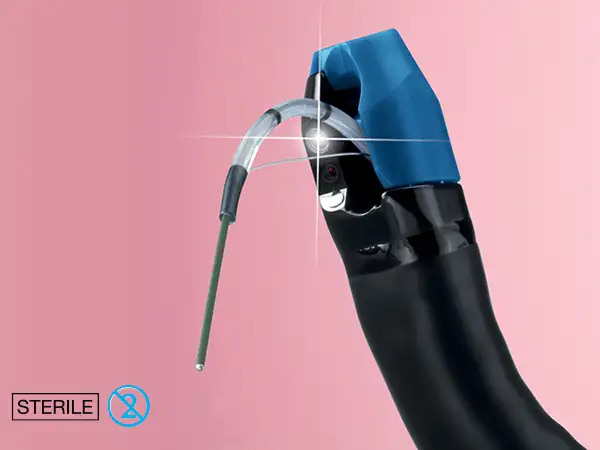
2019
The HYDOME™ duodenoscopy system receives the Red Dot Award in the category “Product Design 2019”.
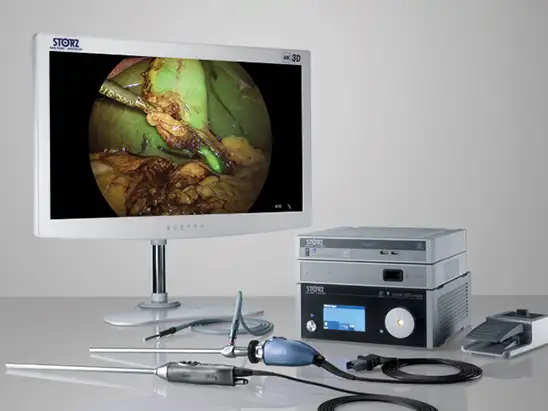
2020
Launch of IMAGE1 S™ Rubina®: 4K, 3D and NIR/ICG Fluorescence Imaging.
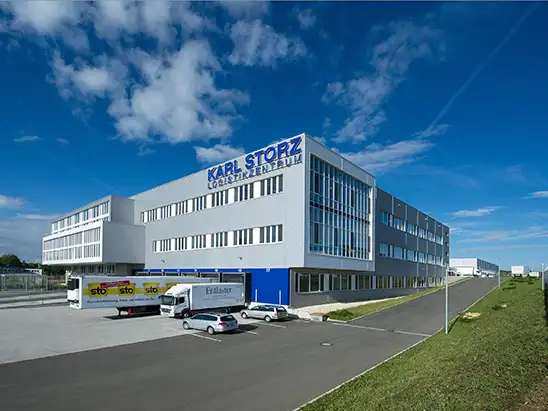
2021
Expansion of the logistics center and construction of a new production facility in Neuhausen ob Eck: KARL STORZ is making the largest investment in the company's history with a triple-digit million cost – the expansion is scheduled for completion at the end of 2024.
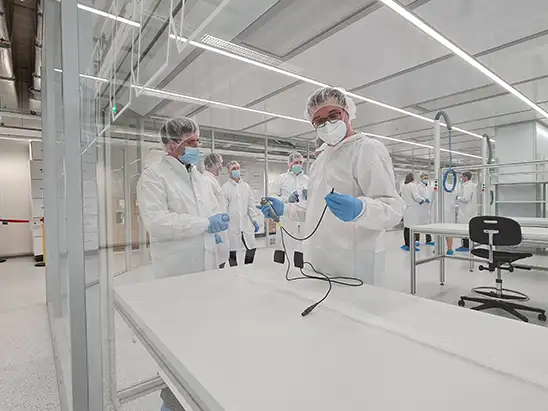
2022
Start of single-use production in Tallinn (Estonia).
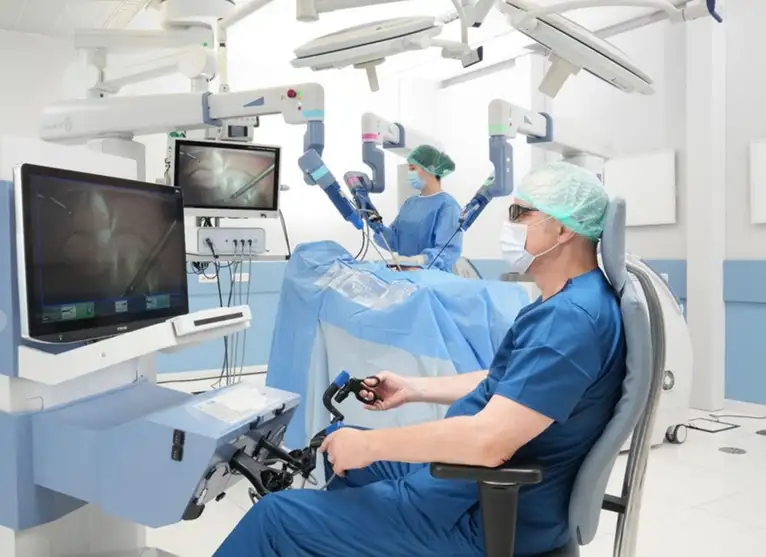
2024
Successful acquisition of Asensus Surgical to further drive the robotics business
